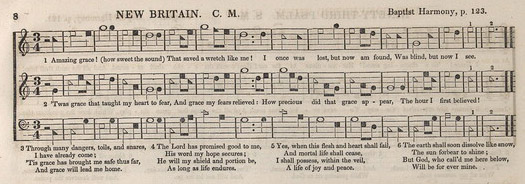If you’ve ever been the recipient of a grace — an undeserved second chance, an unexpected kind word, an unanticipated new beginning — you know the joy and sense of release these experiences bring. Experiencing a true grace restores, empowers and transforms those who receive it.
We humans need grace. My work as a hospital chaplain reminds me daily that we all benefit from a worldview where grace is both given and received and where the divine is full of grace and mercy.

J. Claude Huguley
Despite this, we humans often find grace hard to accept. We resist it, limit it, try our best not to need it and frequently withhold it from ourselves and others. A worldview of fear often drives our actions, our attitudes and our theology, eventually producing the distortions of power, control and the many forms of violence that lead to more fear.
You might think the opposite would be true. Wouldn’t we be eager to accept grace and allow its healing power into our lives and the people around us? Apparently not. Even Christians, who proclaim a gospel of grace, often deny the fullness of its reach and limit its function to purchasing salvation for us after we die.
Limited grace
From childhood into adulthood, I embraced this more limited grace. As a fear-based grace, it was constrained by a worldview of fear. It seemed biblical — and it is — as long as selected passages are interpreted through a lens of fear.
“It seemed biblical — and it is — as long as selected passages are interpreted through a lens of fear.”
This common evangelical interpretation presents a God who evokes fear while exercising unlimited power, control and mastery over a created universe deemed “good.” While this God is seen as loving, there is always an underlying threat of annihilation endangering the whole creation. This loving God creates humanity to be active and trusting participants (and co-creators) within this wider universe.
But humanity does not follow the plan. Human beings do not trust or respect God’s limits, and this disobedience (sin) reveals new elements of fear — God’s hatred of sin, God’s constant shaming and guilt-inducing judgments, and the punishments God inflicts. Still, there is grace. God does not annihilate everyone. And God sends Jesus to be a gracing sacrifice for sin, bringing humanity back into right relation to God.
So there is grace here, but it is a limited grace. Plenty of fear remains, and those who are unable or unwilling to accept this grace are doomed to spend eternity outside the presence and grace of God.
Furthermore, this is a reactive grace, coming after human sin does its damage. If sin induced God to react with grace, wouldn’t there be a risk that God might someday make a different choice and stop being gracing?
This limited grace thus perpetuates and maintains an atmosphere of fear. Within this atmosphere, our self-worth is derived from what we have or what we do. The more we have or the more we do, the more valuable we are. When we do less or have less, we are worth less. The standard of measurement may be possessions, physical or social qualities, piety, education or any other attribute that gives us power or security within this world of fear.
In this system, everybody else is also competing for this illusive “worth” where my gain is your loss and your gain my loss. As worth must be earned and is constantly changing, we have every incentive to earn more, protect what we have and keep it from others.
This valuing system fuels fear of failure, fear of loss, fear of the other. Distrust and conflict abound. Indeed, all “sins” of humanity — from individual ones enumerated in the Seven Deadly Sins to systemic ones like racism, economic and sexual exploitation, and violent conflict — find their roots in this fear.
“As long as we do our living within this atmosphere, this worldview of fear, we will resist and limit grace, withholding it from others and ourselves.”
And here is the problem. As long as we do our living within this atmosphere, this worldview of fear, we will resist and limit grace, withholding it from others and ourselves. Like a fish unaware it is surrounded by water, we may live with little awareness of how this fear orientation constantly influences our actions, our self-understanding and our theology.
A better way
Is there another way? Yes, I believe there is. The four Gospels and the bulk of the New Testament present a message of good news that is all about grace — an atmosphere infused with grace, true grace, unlimited grace.
The prologue of John’s Gospel announces, “In the beginning was the Word. … And the Word became flesh and lived among us, and we have seen his glory, the glory as of a father’s only son, full of grace and truth.”
In Luke’s Gospel, Jesus’ first public sermon has him reading from a scroll of the prophet Isaiah and applying the fulfillment of its gracing message to himself and his ministry: “The Spirit of the Lord is upon me, because he has anointed me to bring good news to the poor. He has sent me to proclaim release to the captives and recovery of sight to the blind, to let the oppressed go free, and proclaim the year of the Lord’s favor.”
“The being and doing of Jesus is all about grace and love and welcome for everyone.”
Throughout the Gospels (and most explicitly in John), Jesus identifies himself as the embodied expression of the divine will and purpose. He tells his followers, “I and the Father are one” and “If you know me, you will know my Father also” and “The words that I say to you I do not speak on my own, but the Father who dwells in me does his works. Believe me that I am in the Father and the Father is in me.”
Jesus’ message — this gospel message — is simple but unspeakably profound. If you see Jesus, you are seeing God. If you watch what Jesus does, you are watching what God does. If you hear Jesus’ words, you are hearing the words of God. If you join with Jesus in the works he is doing, you are doing the works of God.
And the being and doing of Jesus is all about grace and love and welcome for everyone.
God is full of grace, not judgment and oppressive rules. The God of all, like Jesus, is about vulnerable, giving love, not fear. Jesus is inviting the whole of humanity to fully live in this atmosphere where grace abounds. This is truly good news, gospel.
Good news, but …
The common evangelical framing I referenced earlier sees these same Scriptures but still embraces a more limited grace. This need not surprise us. The religious authorities of Jesus’ day opposed him and his message. The early church was filled with those who tried to limit the gospel of grace to those who strictly followed the Jewish law. Throughout church history, there have been many efforts to limit the full flowering of God’s grace.
“Throughout church history, there have been many efforts to limit the full flowering of God’s grace.”
A worldview of fear is afraid of grace. Grace disarms fear, threatening the “riches” of those with possessions, privilege or power. The more “rich” we become, the harder it is to accept the generosity of grace for all.
The grace Jesus brings offers a different valuing system for assessing our true worth and the worth of those around us. Our value is not based on what we do (or don’t do) or what we have, but comes from the gift we all share of being God’s beloved.
This grace knows us for who we truly are (past, present and future, warts and all) and yet continually invites us into the unending grace that brings healing for every hurt, empowering and transforming all who will trust and receive it.
Grace for all
There is grace for each of us and grace for all. There is the ongoing invitation to join with the God of grace in a dance of giving, receiving and giving again with trust. Kindness, acceptance, forgiveness, gratitude, humility and all their fruits flow freely when the abundance of grace is unhindered.
This invitation into this atmosphere of grace is always available but never forced upon us. Grace is not coercive or controlling. God’s grace is trusting and giving and vulnerable and invites us to be. When we trust grace like this, we become more gracing to ourselves, to others and to the whole creation.
But even where grace abounds, we are vulnerable to fear. When those around us are measuring our worth by what we have or the power we wield, it is tempting to reengage the tools of fear and inflict new hurt upon others and ourselves. Many times, we choose fear over grace, revealing our need for more grace.
This grace is available and provides healing and hope. Jesus came to “proclaim release to the captives and recovery of sight to the blind, to let the oppressed go free, and proclaim the year of the Lord’s favor.”
Trust grace. Be grace. Do grace. May we embody this grace in our living.
Claude Huguleyis a son, brother, husband, father and grandfather who has served as a hospital chaplain for more than 30 years in Nashville, Tenn. He is the author of a new book, Trusting Grace: The Journey from Fear to Love. He and his family are members of Immanuel Baptist Church in Nashville.
Related article:
What if grace is more amazing than we thought? | Opinion by J. Claude Huguley

